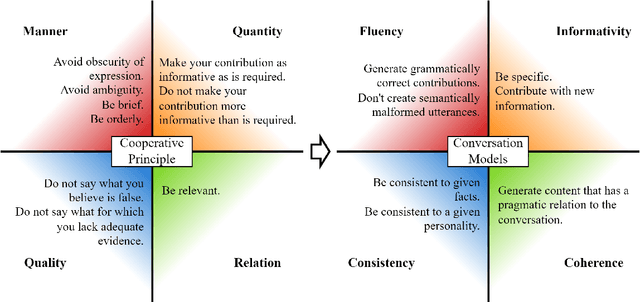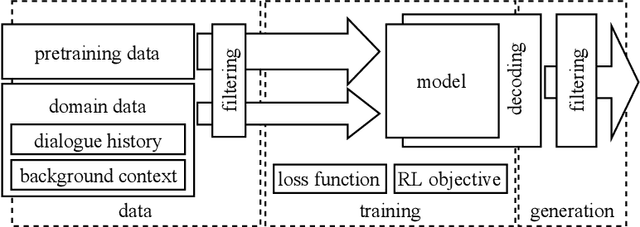Fabian Galetzka
Neural Conversation Models and How to Rein Them in: A Survey of Failures and Fixes
Aug 11, 2023

Abstract:Recent conditional language models are able to continue any kind of text source in an often seemingly fluent way. This fact encouraged research in the area of open-domain conversational systems that are based on powerful language models and aim to imitate an interlocutor by generating appropriate contributions to a written dialogue. From a linguistic perspective, however, the complexity of contributing to a conversation is high. In this survey, we interpret Grice's maxims of cooperative conversation from the perspective of this specific research area and systematize the literature under the aspect of what makes a contribution appropriate: A neural conversation model has to be fluent, informative, consistent, coherent, and follow social norms. In order to ensure these qualities, recent approaches try to tame the underlying language models at various intervention points, such as data, training regime or decoding. Sorted by these categories and intervention points, we discuss promising attempts and suggest novel ways for future research.
A Corpus of Controlled Opinionated and Knowledgeable Movie Discussions for Training Neural Conversation Models
Mar 30, 2020



Abstract:Fully data driven Chatbots for non-goal oriented dialogues are known to suffer from inconsistent behaviour across their turns, stemming from a general difficulty in controlling parameters like their assumed background personality and knowledge of facts. One reason for this is the relative lack of labeled data from which personality consistency and fact usage could be learned together with dialogue behaviour. To address this, we introduce a new labeled dialogue dataset in the domain of movie discussions, where every dialogue is based on pre-specified facts and opinions. We thoroughly validate the collected dialogue for adherence of the participants to their given fact and opinion profile, and find that the general quality in this respect is high. This process also gives us an additional layer of annotation that is potentially useful for training models. We introduce as a baseline an end-to-end trained self-attention decoder model trained on this data and show that it is able to generate opinionated responses that are judged to be natural and knowledgeable and show attentiveness.
 Add to Chrome
Add to Chrome Add to Firefox
Add to Firefox Add to Edge
Add to Edge